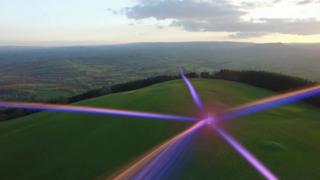Old TV signals used to plug Monmouthshire broadband gap

The broadband gap in a part of rural Monmouthshire is set to be plugged by TV broadcast frequencies left over from the digital switchover.
A pilot scheme will see TV white space used to send a high-speed broadband signal from a standard mast.
Filmmaker Martin Phillips is taking part and said it would “revolutionise” working from his home in Llanarth.
But some experts have said more should have been done to deliver fibre broadband to as many homes as possible.
White space uses the spare spectrum in the UHF band, no longer needed for television broadcasts following the digital switchover.
Llanarth is the second community to take part in the scheme, which is already up and running on the Isle of Arran in Scotland.
Domain name registry firm Nominet is partnering with telecoms firm Broadway Partners to roll it out.
Filmmaker Martin Phillips has signed up to the pilot in Llanarth
There have been several trials of white space technology (TVWS) in the UK.
BT ran some on the Isle of Bute and in Sutton, Suffolk, but has since moved its attention to other technologies.
Like a television signal, broadband delivered in this way can travel up to 10km (six miles) over hills, through buildings and trees direct to people’s homes.
It has been recognised for some time that it can help plug the gap in coverage in rural areas.
What is new, according to the companies involved, is that now it is commercially viable and can deliver faster speeds.
Mr Phillips, who used to struggle to send footage to clients via the internet, said: “It’s the consistency that makes the difference for us.
“It’s knowing that once you press a button it will work, it will send, and the fact it’s raining or cloudy or windy outside isn’t going to change that.”
The former chief technical officer of BT, Peter Cochrane, said rural areas had been neglected.
He said: “All of these stop-gap measures are like a finger in a dyke. They under-provide the band width, they hardly meet today’s needs let alone tomorrow’s.
“We’re wasting billions betting on things that can’t possibly meet our needs in the future. ”
The UK’s broadband infrastructure is run by Openreach, which agreed a split from BT following concerns from the regulator Ofcom.
An Openreach spokesman said 80,000 internet exchange boxes had been installed across the country to connect fibre broadband to properties.
He added: “The rural roll-out is accelerating at pace and we will find the gaps are being closed.”
